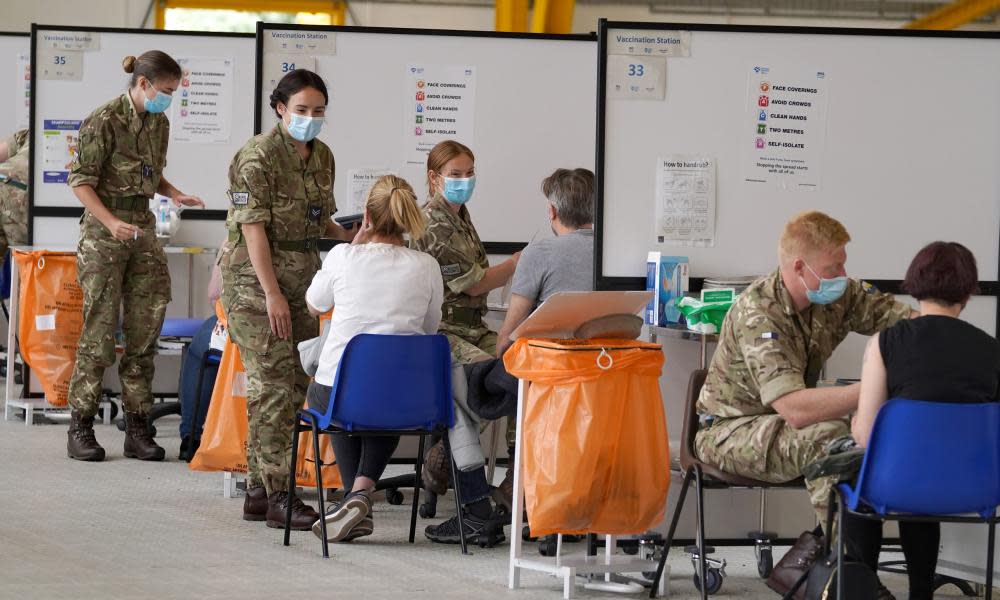Covid infection rates have risen steeply in Scotland, ONS data reveals

Covid infection levels have risen steeply in Scotland and experts say the next few weeks will be crucial in monitoring the impact of the Delta variant across the UK.
According to the latest data from the Office for National Statistics (ONS) based on swabs collected from randomly selected households, an estimated one in 220 people in Scotland are thought to have had Covid last week – an increase from about one in 600 people in the week ending 12 June.
In England an estimated one in 440 people are thought to have had Covid in the week ending 19 June, up from about one in 520 people the week before.
The ONS data suggests infection levels have risen in the north-west and the north-east of England, and there are early signs of a rise in the east of England and the south-west.
Sarah Crofts, the head of analytical outputs for the Covid-19 Infection Survey, said the data showed increases in infections across Britain, most likely as a result of the Delta variant.
“Although the figures are still low compared to earlier in the year, the next few weeks will be crucial in monitoring the impact of the Delta variant on infection levels and the approaching end of restrictions,” she said.
According to daily government figures, seven-day case rates for Cornwall and the Isles of Scilly increased from 4.9 per 100,000 people on 3 June to 150.1 per 100,000 people on 19 June.
default
The latest estimate for the R number in England – the average number of people an infected person goes on to infect – is between 1.2 and 1.4, and the number of new infections is growing by between 3% and 5% a day. In the south-west, infections are growing between 6% and 11% a day. Owing to time lags in the data, these figures reflect the situation two to three weeks ago.
While Downing Street has denied that the recent G7 summit in Cornwall is to blame for the recent rise in cases, others have said the arrival of people linked to the event, as well as half-term visitors, could be among the factors at play.
Figures from Public Health England (PHE) show that to date in the UK there have been 111,157 confirmed and probable cases of the Delta variant, a rise of 35,204 – or 46% – since last week, with the variant now accounting for almost all new Covid cases. PHE said the latest variant counts could be an underestimate, as 12,000 samples had not been included due to a potential cross-contamination problem.
PHE said another variant, first documented in Peru and known as Lambda, had been designated as a variant under investigation (VUI). It is already classed as a variant of interest by the World Health Organization. So far, six cases have been found in the UK – four in London, one in the south-west and one in the West Midlands, and PHE said all were linked to overseas travel.
The variant has sparked interest due to its international spread and the presence of several potentially worrying mutations including L452Q, F490S and D614G, the latter of which is also present in the Delta variant, among others.
Related: Row over Scotland non-essential travel ban to Manchester escalates
According to another report by PHE, of the 92,029 cases of the Delta variant from 1 February to 21 June, 82,458 were in people aged under 50, of whom 52,846 were unvaccinated. Of the 1,320 hospital admissions within that period, 902 were among under-50s, of whom 695 were unvaccinated.
The data supports findings that while two doses of the Covid jabs are highly effective against hospitalisation and death, even with the Delta variant they do not offer 100% protection.
According to the figures for people who had received two doses of the jab, from 1 February to 21 June there were 190 hospital admissions, 163 of which were in the over-50s, and 50 deaths, all of which were in this older age group.
One Spi-M member, speaking off the record, said the vaccines were doing well at preventing symptomatic infection, but even among the vaccinated, proportionally more deaths would be expected among older people as they are more vulnerable to the disease.
Dr Adam Kucharski, of the London School of Hygiene & Tropical Medicine and also a member of Spi-M, said the findings were not unexpected. “Obviously a small individual risk of hospitalisation can add up to a large number of admissions if epidemic grows big enough,” he said. “But I would say that these figures aren’t as concerning as they may seem at face value. If populations are highly vaccinated, we’d expect a higher proportion of cases to have been previously vaccinated because by definition, there aren’t as many non-vaccinated people around to be infected.”

 Yahoo Movies
Yahoo Movies 
